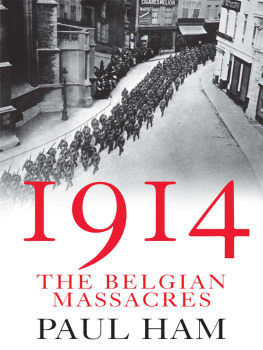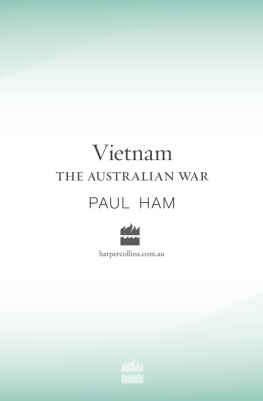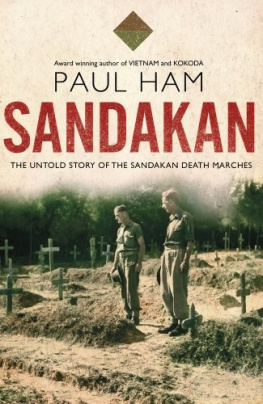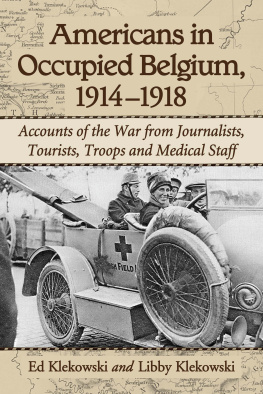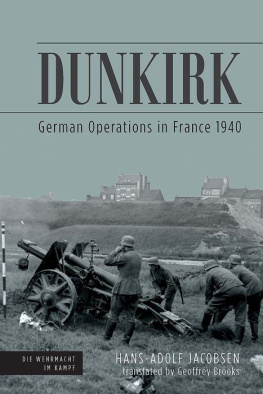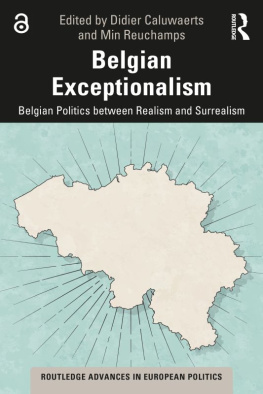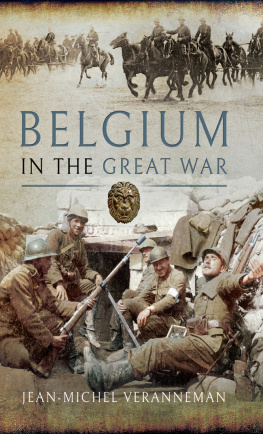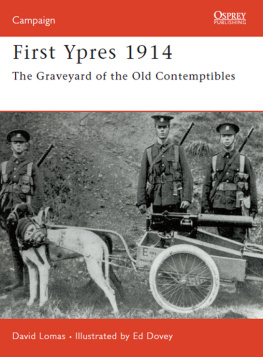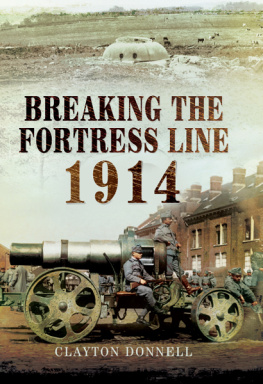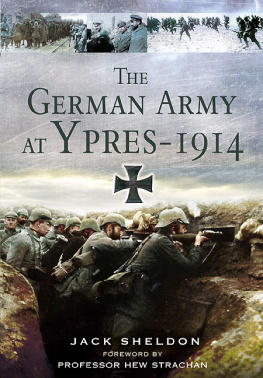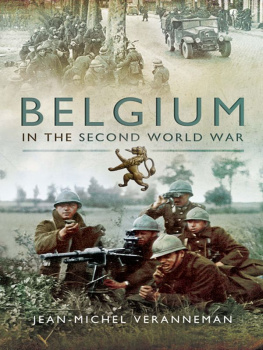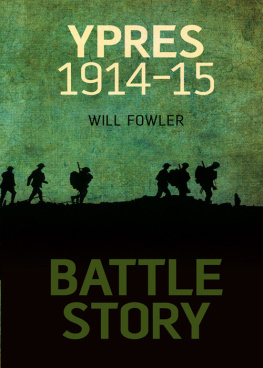
About the Book
In the early stages of the First World War some 800,000 German troops defied Belgian neutrality and marched across the border.
Their orders were to invade France, destroying any Belgian resistance in their path. The German commanders were to achieve this within 6 weeks. What followed was the rape and massacre of hundreds of Belgian civilians. Scores of villages were burned. The beautiful library at Louvain was left in ashes. Such crimes were not arbitrary acts of drunken violence. They were planned and approved under the German military code. In this extract from his book 1914: The Year the World Ended , historian Paul Ham shows how the invasion of Belgium set a brutal precedent for the Nazi occupation of Europe, 25 years later.
Contents

INTRODUCTION:
On 4 August 1914 Germany invaded Belgium, in brazen defiance of Belgian neutrality, the final act that brought Britain into the war and doomed Europe to destruction. It announced to the world that Germany indeed intended to fight a European war on two fronts, against France and Russia, according to the staggering war plan laid down in 1905 by the Prussian military planner, Count Alfred von Schlieffen.
The Schlieffen Plan decreed that Germany would defeat France first, in the seemingly impossible time frame of six weeks, while a small force held back the Russian forces, which, Schlieffen assumed, would take as long to mobilise. Then the full strength of the German army would turn east and slay the Russian bear.
Why enter France through Belgium? Chiefly because the Belgians were not expected to resist and the flat, poorly defended plains facilitated easier passage than the fortified sections of the border between central France and Germany.
Many times in the previous decade the Great Powers had come close to hostilities: over African colonies, over Morocco, during the Balkan Wars, and over the Anglo-German navy race. They had always pulled back from the brink. This time the militarists and the media all the voices prophesying war overwhelmed their complacent and timid civilian rulers and decided that the European powers would answer their differences at the point of the sword.
Austria-Hungary had already declared war on Serbia, on 28 July, triggered by Serbias complicity in the assassination of the Archduke Franz Ferdinand, the heir to the Dual Monarchy. The German government had propelled this outcome by giving Vienna a blank cheque to do as it pleased to the Serbs: Germany would always be ready, in the rear, to help.
The Austro-Hungarians had hoped initially to keep the war confined to the Balkans. They were dreaming. Everyone knew that if Vienna (with German support) authorised a war on Serbia, Russia would be compelled to defend its Balkan ally. Everyone knew that if Russia entered the war, so too would Germany. And all the Great Powers knew that when Germany mobilised when Berlin charged out of the fortress it would do so on a scale and with a ferocity that had no precedent in human history.
And so, the first nation to feel the full wrath of the German army was little Belgium, pathetically defended and utterly naked to the storm.
THE RAPE OF BELGIUM
In the future, villages in the vicinity of places where railway and telegraph lines are destroyed will be punished without pity (whether they are guilty or not of the acts in question). With this in view hostages have been taken in all villages near the railway lines, which are threatened by such attacks. Upon the first attempt to destroy lines of railway, telegraph or telephone, they will immediately be shot.
Field Marshal Colmar Frieherr von der Goltz,
German military governor of Belgium
NOBODY EXPECTED LITTLE BELGIUM to put up any resistance, least of all the Germans. The rage of dreaming sheep was how a Prussian statesman described the Belgians determinations to defend their neutrality. I will go through Belgium like that ! the Kaiser, with a chop of his hand, had indiscreetly confided in a British officer before the war. invade Belgian and French territory. The German reconnaissance patrol briefly dispersed; the Germans soon returned, in force.
Belgium still had a chance to save itself, Berlin warned. When Baron Beyens, the Belgian ambassador in Berlin, requested his passports that day, Jagow repeated the German offer to spare Belgium and repair any damage if Brussels would kindly stand aside, refrain from destroying roads, railways, bridges, etc., and allow the safe passage of hundreds of thousands of German troops through Belgian territory. While they were at it, would they mind abandoning their huge forts at Lige and Namur, the first big obstacles to the German advance? Within an hour, the answer came back: no. To the astonishment of the world, Belgium would stick to its resolution and fight. As King Albert rode to parliament in Brussels that morning to commit his nation to war against the mightiest land army ever assembled, the German infantry prepared to enter the French-speaking region of Wallonia, whose main town is Lige.
In Brussels, meanwhile, crowds, flags and euphoria greeted the Kings open carriage. He walked briskly into the hall, his little sailor-suited 12-year-old son and heir beside him, with the Queen and courtiers in the audience, and delivered the speech that will forever redound to Belgiums glory: Never since 1830 [when Belgium won independence] has a more grave moment come to Belgium: the integrity of our territory is threatened! To great cheers of Long live the King! Long live Belgium!, Albert warned:
if we must resist the invasion of our soil and must defend our threatened homes, this duty, hard though it be, will find us ordered and prepared for the greatest sacrifices. From this moment the valiant youth of our nation stand ready, firmly resolved with the traditional tenacity and calmness of the Belgians to defend their fatherland at a moment of danger
Then he turned to the members of the Legislative Chamber: Gentlemen, are you determined unswervingly to maintain intact the sacred gift of our ancestors? The hall resounded with cries of Yes! Yes! Yes!. If the foreigner, the King concluded, should violate our territory, he will find all Belgians grouped around their sovereign and around a Government possessing the absolute confidence of the entire nation. A great roar went up: Long live the King, long live Belgium! The King paused. God will be with us in this just cause, he reassured them, and departed.
The streets swam with delirious crowds, crying Down with the Germans!, Death to the assassins! He would disagree with his sovereign, however, over the deployment of the Belgian forces, scattering them around the country in the spirit of non-confrontational neutrality rather than aligning them on the German border.

Soon after the Kings speech, the question of where to place the Belgian Army was redundant. Within an hour, the brunt of the German invasion the cavalry had made short work of the border resistance and entered Belgian territory proper, hoisting the black eagle in every village and issuing proclamations that the destruction of roads and bridges would be considered hostile acts. As they barged into each community, the Germans were, at first, almost apologetic: they had violated Belgian territory with regret and meant no harm, so long as the Belgians stood aside.

